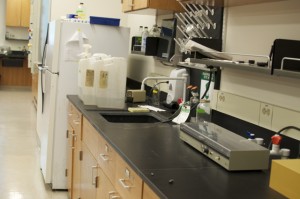Research can sometimes be tedious for students. It’s difficult to do countless hours of searching without any guarantee that you’ll find what you’re looking for. However, the College’s MUSE program has been able to give students a unique learning experience aided by professors generating the results that students crave.
MUSE (Mentored Undergraduate Summer Experience) is a paid summer program at the College that teams up students with professors to work on a project. A proposal is made from their collaborative efforts, and they spend eight weeks doing extensive research on that project.
Because the program covered a wide range of majors, there was plenty of diversity in each project.
Senior economics major Nick Malmi had a project that focused on how the New Jersey education system is taking action due to the rise of children diagnosed with autism. He did a case study of three school districts near the College and interviewed special service directors to determine the quality of these autism programs.
“The MUSE program taught me that research is more open ended,” Malmi said. “For every question I answered, a dozen more would come up, and it was up to me to create an understandable and thorough report of my findings. It taught me how to be responsible for my own project and to constantly look for answers without overbearing supervision.”

Senior physics major Mitch Revalski went a different route, studying “active” galaxies that are constantly changing in brightness due to black holes. He used satellite data from a space telescope known as Kepler.
“I got quite a lot out of our research and the MUSE program,” Revalski said. “I am co-author on a research paper discussing our results which was recently published and we are currently working on a second publication. I have also greatly increased my programming and technical skills, allowing me to do much more in both research and my classes.”
Along with the experience and knowledge, students were able to grow in other ways and gain different traits throughout their studies. One thing that junior biology major Amanda Goble got out of the program was confidence.
“I definitely grew in confidence as a researcher this summer,” Goble said. “I put in a lot of hours and worked very hard in organizing my research in order to fit as much as I possibly could in the time I was given.”
There’s no doubt that the students who participated in MUSE got a great deal out of the program, but they’re not the only ones. The professors who worked with the students were able to enjoy the unique experience of working one on one with a young mind in order to build something special together.
Even though students are encouraged to do a great deal of work and research on the projects, help from the professors is also crucial, and the reward for the faculty members goes way beyond anything tangible.
“MUSE is magical,” said Elizabeth Borland, a sociology and anthropology professor at the College. “Having the combination of summer break from classes and the chance to work with a student who is dedicating time, attention and brainpower to collaborative research is extremely valuable.”
Benny Chan, the program director of MUSE and an associate professor of chemistry at the College, is ecstatic about the different projects that MUSE has created. The key to bringing out the creativeness of the students, Chan said, is the amount of time and focus they’re able to put into MUSE.
“Students are given the opportunity to work full time under the guidance of a faculty mentor when they have no other academic distractions,” Chan said. “They learn in-depth skills that may be difficult or too time consuming to learn during the academic year course or independent study.”
As a program that is not typically campus-wide among universities, it would be no surprise to see other schools picking up a similar concept.
“This program should be done by other colleges because it helps students understand what academic research is like,” Malmi said. “It gives students a chance to work with their professor outside of the classroom and work on real world problems.”
“We are lucky that the leadership at the College has dedicated resources to programs like MUSE and has made it a priority to expand rather than cut opportunities for undergrads to get involved in research and other collaborative work,” Borland said.
The endless hours of time and research these students have put in is a testament to their commitment and desire to learn. After participating in MUSE, all of them can say they’ve come out with an invaluable experience under their belts. And while all the research may be tough and complicated and times, it pays off in the end, sometimes in the simplest way.
“(My) best type of memory is what would be what you might call that ‘yes’ moment,” Revalski said. “When whatever you had been working on finally worked flawlessly and you accomplished the task. There are not definitive answers for everything in research, and often more than one way to solve a problem, so figuring out and implementing a solution yourself is immensely gratifying.”






